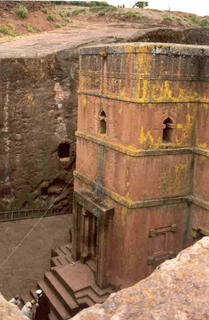Jean-Louis Florentz and the Greater World of Music
Yesterday, N. and I attended the Sunday afternoon
organ recital at Washington's National Cathedral.
For me, by far, the highlight was a performance
of an extract from Jean-Louis Florentz's Laudes, Opus 5,
(1983-85), inspired by the Ethiopian Orthodox Christian
liturgy. The melody of the Ethiopian Magnificat
Watibye Mâryâm appears in pure form
in Mary's harp, the third of the seven
sections of this 30 minute masterpiece.
Jean-Louis Florentz (1947-2004) studied
in Paris under Olivier Messiaen, Pierre Schæffer,
and Antoine Duhamel. He complemented his musical
studies with studies in natural sciences, Arab studies,
ethno-musicology, and the Ethiopian Semitic language.
He lived for substantial periods of time in the Antilles,
in Polynesia, in Kenya, and in Israel, where he
spent his time in close contact with the Orthodox Ethiopian
community of Jerusalem - West -- Monastery Däbrä Gännät.
(Ethiopian Orthodox music from Däbrä Gännät is available
on the Radio France - Ocora label).
In 1978, Florentz won the Prix de composition Lili Boulanger;
and in 1990, Florentz won the Musical Prize of the
Foundation Prince Pierre of Monaco for his Asun
[Assumption Requiem of the Virgin], Opus 7, a 50 minute
choral work for soloists, chorus, children's chorus,
and orchestra. This choral masterpiece is deeply informed
by the French symphonic tradition since Debussy and by
Ethiopian Orthodox music. He taught ethnomusicology at
the Conservatoire National Supérieur de Lyon beginning
in 1984. He was elected member of the Académie des
Beaux-Arts (Institut de France) in 1995. Olivier Messiaen
was reported to be deeply impressed with Florentz's work.
Earlier in his career, Florentz studied the ethno-ecology
of animal communication and Equatorial avian polyphony
-- topics on which he published papers.
The score and recording to Asun
[Requiem of the Virgin] is published by Ricordi.
An excerpt is available for auditioning at the IRCAM (Paris)
web-site at:
http://brahms.ircam.fr/textes/c00000797/

Lalibela Orthodox Church, Ethiopia, built in
the 12th c. C.E.
organ recital at Washington's National Cathedral.
For me, by far, the highlight was a performance
of an extract from Jean-Louis Florentz's Laudes, Opus 5,
(1983-85), inspired by the Ethiopian Orthodox Christian
liturgy. The melody of the Ethiopian Magnificat
Watibye Mâryâm appears in pure form
in Mary's harp, the third of the seven
sections of this 30 minute masterpiece.
Jean-Louis Florentz (1947-2004) studied
in Paris under Olivier Messiaen, Pierre Schæffer,
and Antoine Duhamel. He complemented his musical
studies with studies in natural sciences, Arab studies,
ethno-musicology, and the Ethiopian Semitic language.
He lived for substantial periods of time in the Antilles,
in Polynesia, in Kenya, and in Israel, where he
spent his time in close contact with the Orthodox Ethiopian
community of Jerusalem - West -- Monastery Däbrä Gännät.
(Ethiopian Orthodox music from Däbrä Gännät is available
on the Radio France - Ocora label).
In 1978, Florentz won the Prix de composition Lili Boulanger;
and in 1990, Florentz won the Musical Prize of the
Foundation Prince Pierre of Monaco for his Asun
[Assumption Requiem of the Virgin], Opus 7, a 50 minute
choral work for soloists, chorus, children's chorus,
and orchestra. This choral masterpiece is deeply informed
by the French symphonic tradition since Debussy and by
Ethiopian Orthodox music. He taught ethnomusicology at
the Conservatoire National Supérieur de Lyon beginning
in 1984. He was elected member of the Académie des
Beaux-Arts (Institut de France) in 1995. Olivier Messiaen
was reported to be deeply impressed with Florentz's work.
Earlier in his career, Florentz studied the ethno-ecology
of animal communication and Equatorial avian polyphony
-- topics on which he published papers.
The score and recording to Asun
[Requiem of the Virgin] is published by Ricordi.
An excerpt is available for auditioning at the IRCAM (Paris)
web-site at:
http://brahms.ircam.fr/textes/c00000797/

Lalibela Orthodox Church, Ethiopia, built in
the 12th c. C.E.


0 Comments:
Post a Comment
<< Home